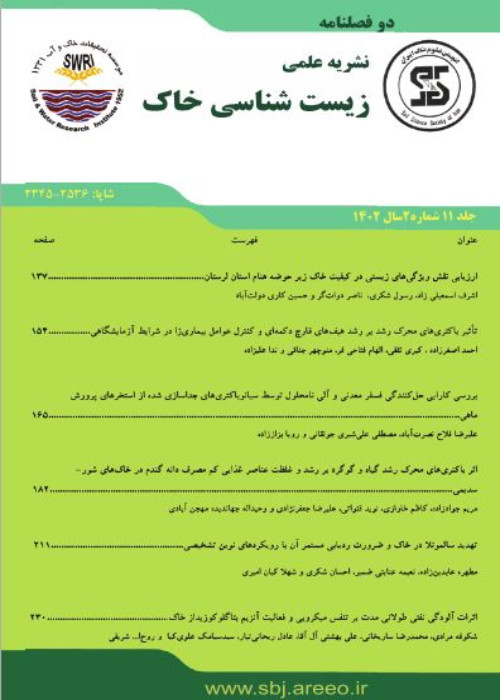Isolation, identification and plant growth promoting characteristics of Cu-tolerant bacteria in a contaminated soil
Author(s):
Article Type:
Research/Original Article (دارای رتبه معتبر)
Abstract:
Plant inoculation with effective plant growth promoting and heavy metal resistant rhizobacteria is an efficient method to improve the phytoremediation efficiency and extraction of heavy metals from contaminated soils. With respect to this reason, astudy was conducted to isolate, identify and evaluate the growth stimulating traits of copper-resistant bacteria from a Cu-contaminated soil. Six rhizospheric soil samples of indigenous plants were collected in Sarcheshmeh Khatoonabad, Kerman province. After screening, six strains were selected. Phenotypic, biochemical and genetic identification data showed that five and one isolates were belong to Pseudomonas and Bacillus genera respectively. Then, the minimum inhibitory concentration of copper, siderophore production, auxin and hydrogen cyanide production, the ability to solubilize mineral phosphate in solid and liquid medium, the ability to solubilize Zn low soluble compounds in solid and liquid medium and production of ACC-deaminase were investigated. The results indicated that all of the isolates were resistant to various concentrations of copper. The maximum resistance to inhibitory concentration of copper was related to K4 and K5 strains at a concentration of 400 mg L-1 of copper. All of the strains were able to produce siderophore in CAS medium except for K6 strains and strain K5 was also the superior in siderophore production. Among the strains, K4 and K6 were not able to produce auxin. There was also a significant difference between auxin productions by isolates K1 with the other isolates, with the highest auxin production (2.07 mg L-1). The results also demonstrated that among the strains, only K4 strain was capable of producing hydrogen cyanide (degree: four=relatively high) and the other isolates were reported as non-production of hydrogen cyanide (degree: one). The results of Three Calcium Phosphate (TCP) solubilizing by isolates in PKV broth medium showed that K1, K2, and K3 strains had the most phosphorus solubility (706, 661 and 588 mg L-1) respectively and there wasnt significant difference between them. The results demonstrated that K4 and K5 isolates with 0.910 and 0.850 halos to colony diameter had a significant difference with other isolates in solid medium containing ZnCO3 and the rest of the strains, K1, K2, K3 and K6 did not show the ability to solubilize the zinc carbonate as well. The solubilizing of solid zinc oxide in solid medium by K4 strain (halo:colony, 2.11) was the highest solubility of zinc oxide and K1, K2, K3 and K6 strains were not able to dissolve the zinc oxide in the solid medium. They did not show the ability to dissolve the low soluble zinc oxide nor the zinc carbonate compounds. K4 strain had the highest zinc carbonate solubility in the broth (12.5 mg L-1) and the highest solubility of zinc oxide in the broth was attributed to K4 strain (9.76 mg L-1). According to the results, these isolates can be used for enhancing phytoremediation efficiency of this element in contaminated soils.
Keywords:
Language:
Persian
Published:
Journal of Soil Biology, Volume:5 Issue: 2, 2018
Pages:
95 to 107
magiran.com/p1803332
دانلود و مطالعه متن این مقاله با یکی از روشهای زیر امکان پذیر است:
اشتراک شخصی
با عضویت و پرداخت آنلاین حق اشتراک یکساله به مبلغ 1,390,000ريال میتوانید 70 عنوان مطلب دانلود کنید!
اشتراک سازمانی
به کتابخانه دانشگاه یا محل کار خود پیشنهاد کنید تا اشتراک سازمانی این پایگاه را برای دسترسی نامحدود همه کاربران به متن مطالب تهیه نمایند!
توجه!
- حق عضویت دریافتی صرف حمایت از نشریات عضو و نگهداری، تکمیل و توسعه مگیران میشود.
- پرداخت حق اشتراک و دانلود مقالات اجازه بازنشر آن در سایر رسانههای چاپی و دیجیتال را به کاربر نمیدهد.
In order to view content subscription is required
Personal subscription
Subscribe magiran.com for 70 € euros via PayPal and download 70 articles during a year.
Organization subscription
Please contact us to subscribe your university or library for unlimited access!



